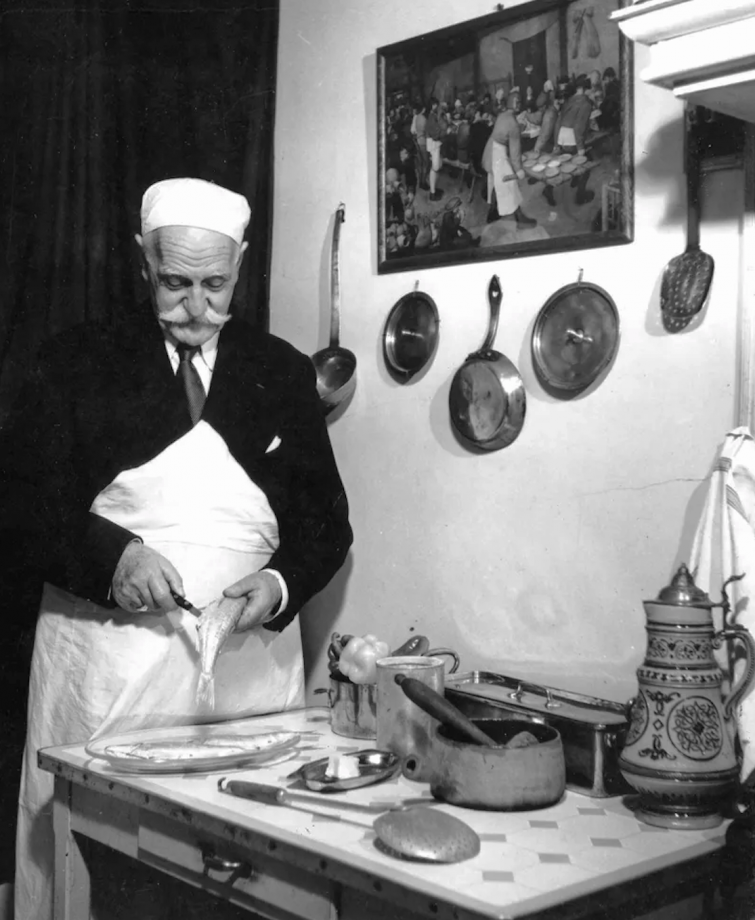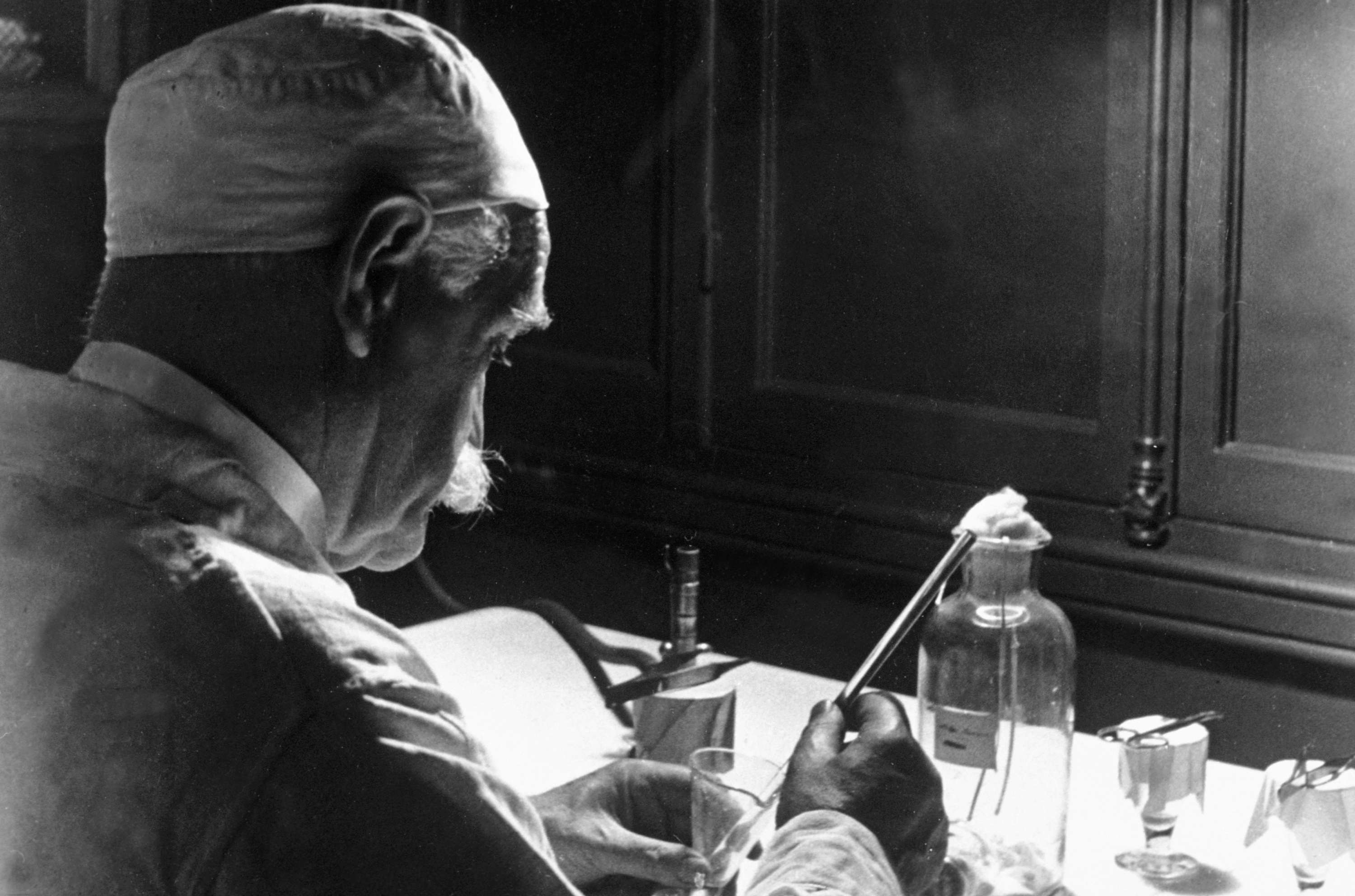
 Museum
Museum
Edouard de Pomiane (1875-1964): the science of cooking
"Cooking should be a precise science" – Edouard de Pomiane

©Musée Pasteur, Portrait of Edouard Pozerski, known as "de Pomiane" (1875-1964), around 1935
April 20, 2025 marks the 150th anniversary of the birth of Edouard Alexandre Pozerski (1875-1964), known as Edouard de Pomiane. As the head of a physiology laboratory and a famous culinary critic, Edouard de Pomiane combined two disciplines that may at first glance appear to have nothing in common: scientific research and food criticism.
Edouard Pozerski was born to Polish political refugees and spent his childhood in Paris. After studying science at Sorbonne University, where he completed a PhD on digestive ferments, Edouard Pozerski joined the Institut Pasteur on May 1, 1901 as an assistant in the Physiology Department that had just been established by Emile Duclaux (1840-1904). He remained in the department for his entire career until 1943, working with illustrious scientists including Ilya Mechnikov (1845-1916) and Emile Roux (1853-1933).

©Musée Pasteur, Portrait of Edouard Pozerski, known as "de Pomiane" (1875-1964), in his laboratory at the Institut Pasteur around 1935.
In addition to his physiology research, Edouard Pozerski became known for his scientific approach to cooking, which he dubbed "gastrotechnology." He defined this approach as knowing and understanding the physical and chemical changes that occur in the composition of ingredients during cooking and other culinary processes. He spent many years actively battling against culinary empiricism.
In 1922, Pozerski published a Treatise on Food Hygiene, and in the same year, under the nom de plume Edouard de Pomiane, the book Eating Well to Live Well. Several more books followed, including The Code of Good Food (1924), Teaching Culinary Technique for Doctors (1928), Cooking in Six Lessons (1936) and Cooking for Sensitive Stomachs (1949).
Edouard de Pomiane was also a pioneer of cookery broadcasting in France with his radio programs. He presented the first radio show about cooking in France, which ran from 1923 to 1929 on Radio Paris. Several of Edouard de Pomiane's books are available in the Institut Pasteur library, including the reissue of two volumes of his radio shows on TSF, entitled Radio-cuisine:
In his books, especially Memories of Half a Century at the Institut Pasteur, published in 1960, Edouard de Pomiane spoke about the culinary dimensions of the Institut Pasteur, like the "Microbe d'Or" canteen on campus or the Institut Pasteur Brewery School led by Auguste Fernbach (1860-1939), which distributed cold beer to all the laboratories in summer.

©Musée Pasteur, Team of volunteer cooks, advised by Mr. Pozerski, known as "Pomiane," in 1944, under the German occupation, preparing meals in a makeshift refectory.
In his Tribute to Pasteur at the "Académie des Gastronomes,” Edouard de Pomiane described Louis Pasteur's eating habits:
“In the morning, Pasteur would have chocolate and a croissant. At noon every day he ate a small mutton chop and potatoes, either fried or mash potatoes. [...] Every Thursday, Pasteur would eat sausages and red kidney beans. Mrs. Pasteur served each person herself. On Sundays in winter, Pasteur would invite his colleagues Roux, Chamberland, Perdric, Wasserzug, Adrien Loir and Duclaux to dine with him. On those days, they ate chicken and drank Arbois wine. At the end of the meal, everyone would be given a glass of wine from Arsures. Pasteur had wine delivered specially from the Arbois region. The wine arrived in barrels and was bottled by Eugène Viala. The bottles were heated for twenty minutes to 60 degrees in basins of water, then stored in the cellar after being carefully numbered, as Pasteur was a man who liked order. He would not have been happy if one of his bottles were to disappear. In the evening, Pasteur would have just a bowl of soup and an egg, as he went to bed very early, immediately after dinner."
Edouard de Pomiane was an early pioneer of what we now know as molecular gastronomy: he was interested in what he termed "critical" temperatures in cooking, energy in food and culinary practices, and cooking methods. Edouard de Pomiane was a founder member of the "Académie des Gastronomes" in 1928. He wrote more than a dozen books and thousands of articles, and he gave many lectures, demonstrating a passion for delicious food based on logic and science. His novel approach influenced several renowned chefs.
Link to the details of the collections in the Edouard de Pomiane archives
Link to biographical information about Edouard de Pomiane
Sources:
- Jacqueline Brossollet, "L'Institut Pasteur vu par un gastronome," in Histoire des Sciences médicales, 1989, pp. 45-50
- Edouard de Pomiane, Eloge de Pasteur prononcé à l'Académie des Gastronomes, 1940